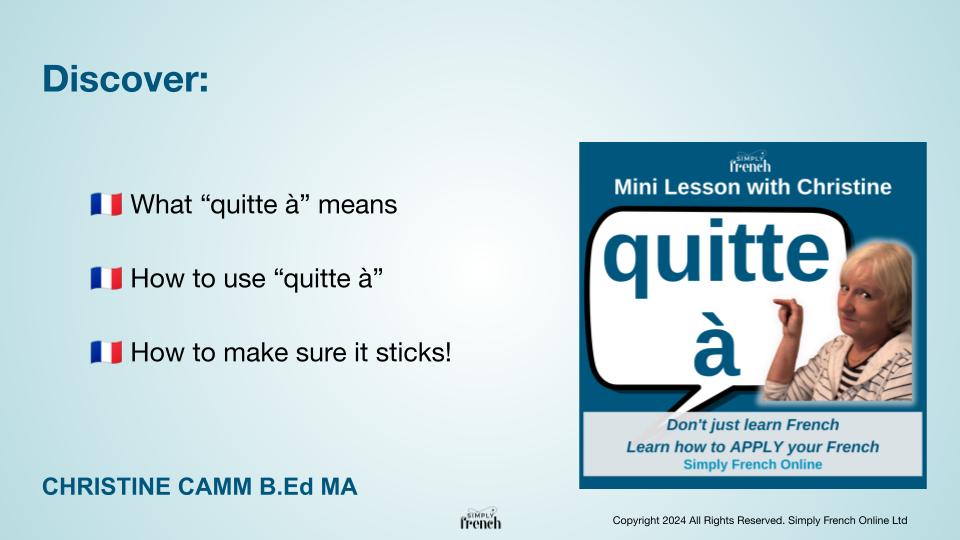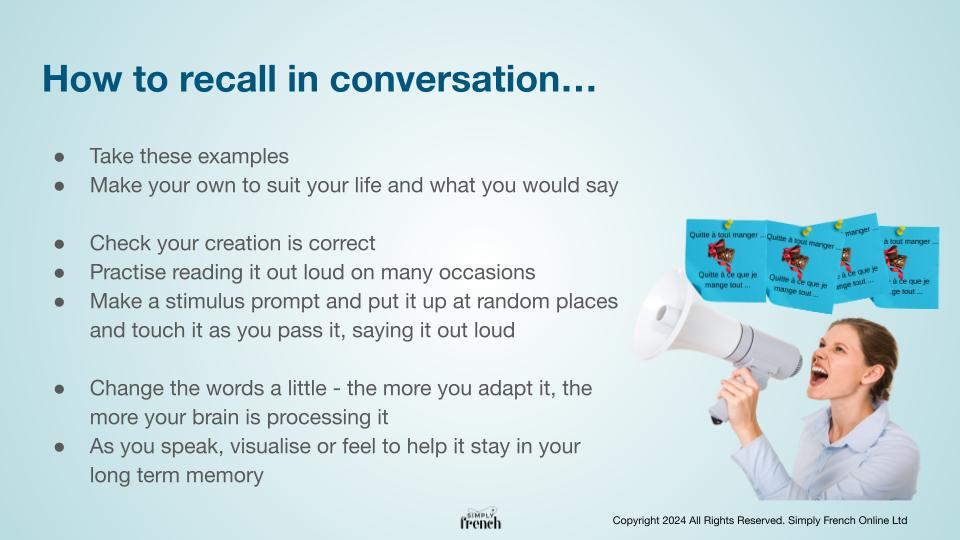What quitte à means
Apr 01, 2024Even if it means you might not use what I am showing you today, I am still going to share it: It’s one that we use quite frequently -
“Even if it means” . . .
There comes a time with our French learning that we want to add some nice phrases to our repertoire, or even just make sense of what people are saying to us.
Because this expression uses the word “quitte” we are automatically going to think it’s related to the verb “quitter - to leave or to quit”.
But it’s not. So after all, it’s a good share today! Discover its intricacies in this mini-lesson:
- What “quitte à” means
- How to use “quitte à”
- How to make sure it sticks!

2 ways to translate the French expression QUITTE À
Have you ever heard the French song “Ne me quitte pas” by Jacques Brel? The general meaning of the verb quitter is to leave.
However, the expression “quitte à” signifies even if in English.
And, there are 2 possible grammatical structures
- even if it means + ing
- even if it means that…
The meaning is exactly the same but you can pick the syntax you prefer in English!

Quitte à in a real context.
Before using the expression quitte à, you would typically have a context and then contrast it with the expression.
Let’s have an example:
- Je pense qu’on devrait voyager en voiture pour explorer la région. >>> I think we should travel by car to explore the region.
In the next sections, you will see the 2 ways to add the expression quitte à...

The structure "quitte à" with the infinitive
Time to add our expression. The easiest one is with the infinitive like this example:
- Quitte à passer plus de temps sur la route, ça pourrait être une aventure formidable. >>> Even if it means spending more time on the road, it could be a great adventure.

The structure "quitte à" with the subjunctive.
Sometimes, an infinitive is not enough and we want to elaborate. In that case, the subjunctive is a solution:
- Quitte à ce que la météo soit capricieuse, ça pourrait être une aventure formidable. >>> Even if it means that the weather is unpredictable, it could be a great adventure.
Let’s see another example with the 2 ways of expressing even if in French:
- Je veux lui dire ce que je pense de sa décision, mais j’ai peur qu’il ne prenne mal. >>> I want to tell him what I think about his decision, but I’m afraid he might take it the wrong way.
- Quitte à provoquer une réaction négative, c’est important de communiquer ouvertement. >>> Even if it means triggering a negative reaction, it’s important to communicate openly.
- Quitte à ce qu’il ne comprenne pas tout de suite, c’est important de communiquer ouvertement. >>> Even if it means that he doesn’t understand right away, it’s important to communicate openly.

Tips to recall in conversation.
When we talk, we normally produce a natural flow of the conversation and we shouldn’t take much time to think before speaking. In other words, you should talk fluently. But, how can you reach fluency and use expressions like quitte à?
First, create your own examples so it’s easier to remember.
Then, you need to be prepared once you are dealing with real conversations. You can practise by reading your sentences out aloud several times.
Now, imagine that when you see something like a post-it or any prompt, it reminds you to say your sentences! This is one of the most effective ideas to practise.
You can always play with words. Indeed, when you change just one then another, you not only reinforce the basic structure, but you also expand your vocabulary.
Finally, do your best to visualise the words because it will help your long memory tremendously.

To summarise, there are 2 ways to translate quitte à in both languages. You can either opt for an infinitive or for the subjunctive in order to explain.
In case, you want to consolidate the subjunctive, I’m sharing with you some mini-lessons about it:
How to form the subjunctive in French
Simple Subjunctive I want you to in French
YES the subjunctive CAN be easy!
So, quitte à mentir (Even if it means to lie), have you ever used this expression? If not, are you willing to try?
Free Masterclass
Learn my 4 step method of how to hold meaningful french conversations the R.E.A.L. way in just 30 minutes a day.
When you signup, we'll be sending you weekly emails with additional free content

